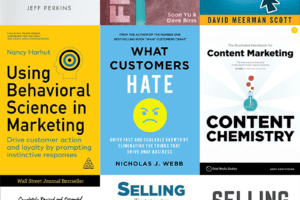Episode 61 of Yes, and Marketing
“The reasons that we first subscribe to something and the reasons that we renew are different.”
Anne Janzer literally wrote the book on subscription marketing, and on this episode she shares how she predicted the current wave of subscription revenue six years ago, and what it takes to be a successful marketer in this new type of economy. Her conversation was the perfect followup to last week’s episode with Tim Riesterer on expansion sales, and she is the second author introduced to the show by Doug Burdett of The Marketing Book Podcast.
As an award-winning author and writing coach, Anne also shared insights for Verblio’s community of 3000 writers (and anyone who needs to write as part of their career):
- Her trick to avoid writer’s block
- The link between empathy, improv, and communication
- The road to subject matter expertise
- Surprising stats from her survey of 400+ nonfiction authors
Tap through the chapters in the audio above or read on for our summary of the episode’s highlights.
Guest-at-a-Glance
???? Name: Anne Janzer
???? What she does: Writing coach, marketing consultant, and award-winning author whose books include Subscription Marketing and The Writer’s Process.
????️ Find Anne on the web: Website | LinkedIn | Twitter
???? Get smart: “The longer you’re in business with a cloud-based or a subscription model, the more of the business revenues are coming from existing customers and less from those new ones.”
Top Takeaways
The subscription economy requires ‘value nurturing’ ????
Marketing for a subscription-based business requires an attitude shift from traditional frameworks. “When someone becomes a customer, your job isn’t done,” Anne explains. “You now need to continue to nurture that relationship.” She calls this ‘value nurturing’ and considers it as essential a marketing activity as lead generation.
Whether by providing content that is valuable to customers as well as prospects or by creating communities among your users, marketers already have the tools needed to add value to the customer experience. It isn’t only up to marketing, though: The customer relationship spans your marketing, sales, operations, and customer success teams, and providing a consistent experience requires collaboration across those teams.
“What marketing needs to do is actually spend a little more time outside their own halls,” Anne says, “to see through that relationship to its end and make sure that it’s a consistent voice and a consistent image.”
Advice for writers: Good writing = good process ????
Anne lists three things you should establish before beginning writing on any project:
- the client’s objective
- the target audience
- the reader’s objective
Aligning on those things upfront allows you to set expectations and avoid having to rewrite based on differing views and last-minute input. By having all relevant stakeholders sign off on the creative brief before any writing begins, you can also ensure everyone will be assessing the final product according to the same objectives.
Episode Highlights
Empathy drives effectiveness
“Effective communication is always about not what you’re saying, but how it lands on the reader or the listener. Anything that you can do to promote or develop a sense of empathy in your writing process, in your content planning process, in your video shooting process, whatever it is you’re doing—you will be more effective.”
How she avoids writer’s block
“I have a practice of free writing, which is just to open up a file and to write for myself. Even if I think I have nothing to say, I’ll just start writing. If I run dry, I’ll think, well, who’s my potential reader and what questions might they ask of me? What would they be interested in? And I’ll write as if I was them asking me things.
…Give yourself permission to write something that you will never use, whose whole purpose is to prime the pump of your brain and rattle around in your attic and find interesting things and put it out there. As long as I do free writing, I never have run into writer’s block.”
Creativity = making connections
“Creativity comes in—even in business writing—from making connections across domains. So don’t just spend all your time focused on your own domain, but look at how this applies to something happening in the consumer space or something happening in the garden. Look across domains and look for patterns. That’s what we’re wired to do anyway, is look for patterns.”
Get marketing involved with customers, not just prospects
“Marketing needs to be really engaged and maybe embedded or have cross meetings with what’s happening in customer support and customer success. If you have meetings, have a representative go and say, ‘Oh, okay. Maybe if a lot of people are running into this thing, we’re not setting expectations right. Or maybe we need to work together to create a fantastic onboarding thing that’s going to save us a lot of cost down the road, in terms of supporting people who keep running into the same thing.’”
You don’t have to be an expert to write a book
“Writing a book is not really about being the expert on the topic. It’s about becoming an expert as you research, as you work, as you write, as you talk to people about it, as you do interviews.”
How to improve your chances of writing success
“Create a simple creative brief and get everybody to sign off on that, because then your arguments at the end or your review cycles are about how well have you executed against these objectives. That’s a much different set of conversations to be having than, is this a good piece? Should we be publishing this?”
One surprising stat from surveying 400 non-fiction authors
“I asked people how closely the finished project matched their outline. And for these authors it was an exact match in six percent. Only six percent ended up with exactly the book they started writing. …More than half made minor changes and about a third made major changes.”
What real writers’ processes look like
“We like to think that the process is you research, you outline, you write. And again, I asked the authors about how closely their process matched that. And that was the truth for about 16% of them. About 60% were writing and researching at the same time, and about another quarter thought they were done researching until they started writing. And then they’re like, ‘Oh no, I need this.’
So I think the takeaway, no matter what you’re writing, is to absolutely do research right away to get yourself going in it, but don’t try to wait until you’ve nailed down the last bit to start writing unless it’s something real short. Because in the process of writing, you’re going to figure out what else you might need to make it that much better.”
Top Quotes
????️ Anne:
“If you’re in marketing and you want to be relevant to the company’s success, you need to be affecting revenue.”
“The longer you’re in business with a cloud-based or a subscription model, the more of the business revenues are coming from existing customers and less from those new ones.”
“The subscription relationship should be beneficial for both parties.”
“The reasons that we first subscribe to something and the reasons that we renew are sometimes different.”
“It’s not easy for people to get outside their own head and their own language. That’s the curse of knowledge.”
“You should love and enjoy your outlines, but do not cling to them if you see a better path forward.”
Learn More
Check out the full results of Anne’s survey of more than 400 nonfiction authors.
Learn more about Anne’s two recent nonfiction recommendations:
- Digital Body Language by Erica Dhawan
- Wanting by Luke Burgis



